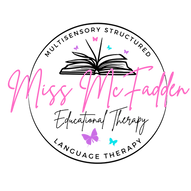
Multisensory Structured Language Therapy at Miss McFadden Educational Therapy is a truly inclusive, evidence-based and therapeutic support for reading, spelling and writing. It is a specialised and clinical approach to support learning for dyslexia, dysgraphia, autism, attention and hyperactive disorders, auditory/visual processing disorders, other neurodiverse conditions, disabilities and all struggling readers. The therapy is unique, flexible and tailored to meet the specific needs and goals of every pupil.

Multisensory Structured Language (MSL) is the instructional approach used to teach literacy throughout all years of life. MSL is a systematic, cumulative, cognitively supportive, direct and explicit approach to teaching everyone and anyone how to read, write and spell. It encompasses the Orton-Gillingham approach through the use of synthetic phonetics and multisensory instruction as best-practice to support working memory for skill acquisition and retention. The multisensory component involves the simultaneous activation of visual, auditory and kinaesthetic/tactile senses to directly activate and strengthen neurological pathways responsible for effective reading. MSL has proven to be the most beneficial support for dyslexic learners and struggling readers. MSL is the only therapy recognised by the Australian Dyslexia Association as an evidence-based therapeutic support for those with dyslexia and other neurodiverse conditions.


Co-occurring conditions and/or disabilities are considered and adjustments and accommodations are made to create a truly inclusive and supportive environment. Sensory sensitivities are considered through light, sound and heating adjustments, movement supports for hyperactivity and tactile modalities are included in the session. Furthermore, special interest including sensory interests can be embedded in the session to optimise engagement and learning.
Miss McFadden Educational Therapy takes a person-first approach for a truly unique and tailored learning experience that improves academic achievement and increases self-esteem.
It is more than a tutoring service or program. It is providing evidence-based, flexible and dynamic educational therapeutic support for struggling neurodiverse readers.

MSL can support the following,
but is not limited to:
dyslexia
dysgraphia
learning disabilities/difficulties
autism spectrum disorder
attention deficit disorder
attention deficit hyperactive disorder
English as second language
developmental delay disorder
cognitive impairment
Irlen syndrome
slow auditory and/or visual processing speed
struggling readers
enrichment/acceleration


